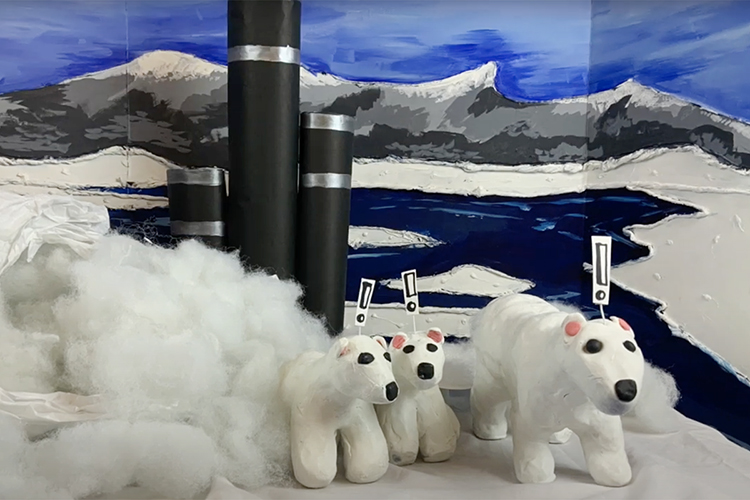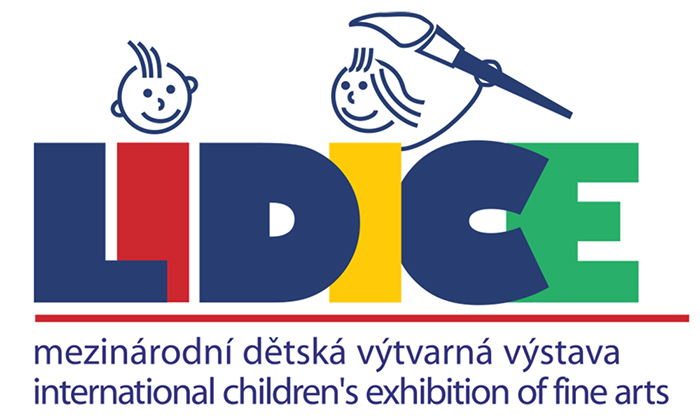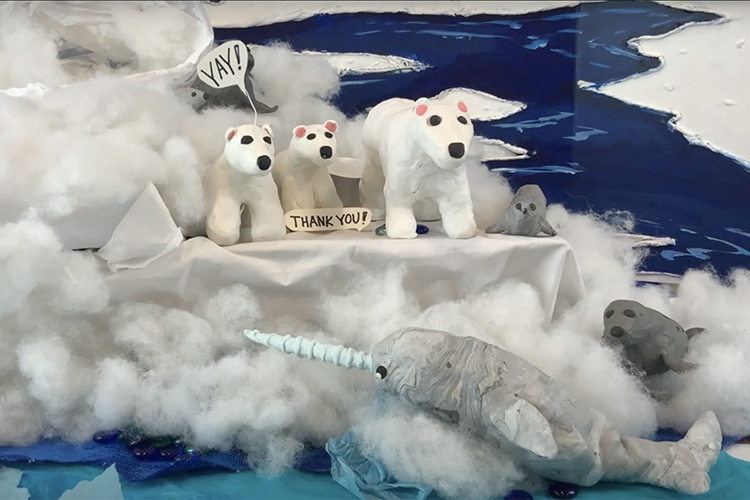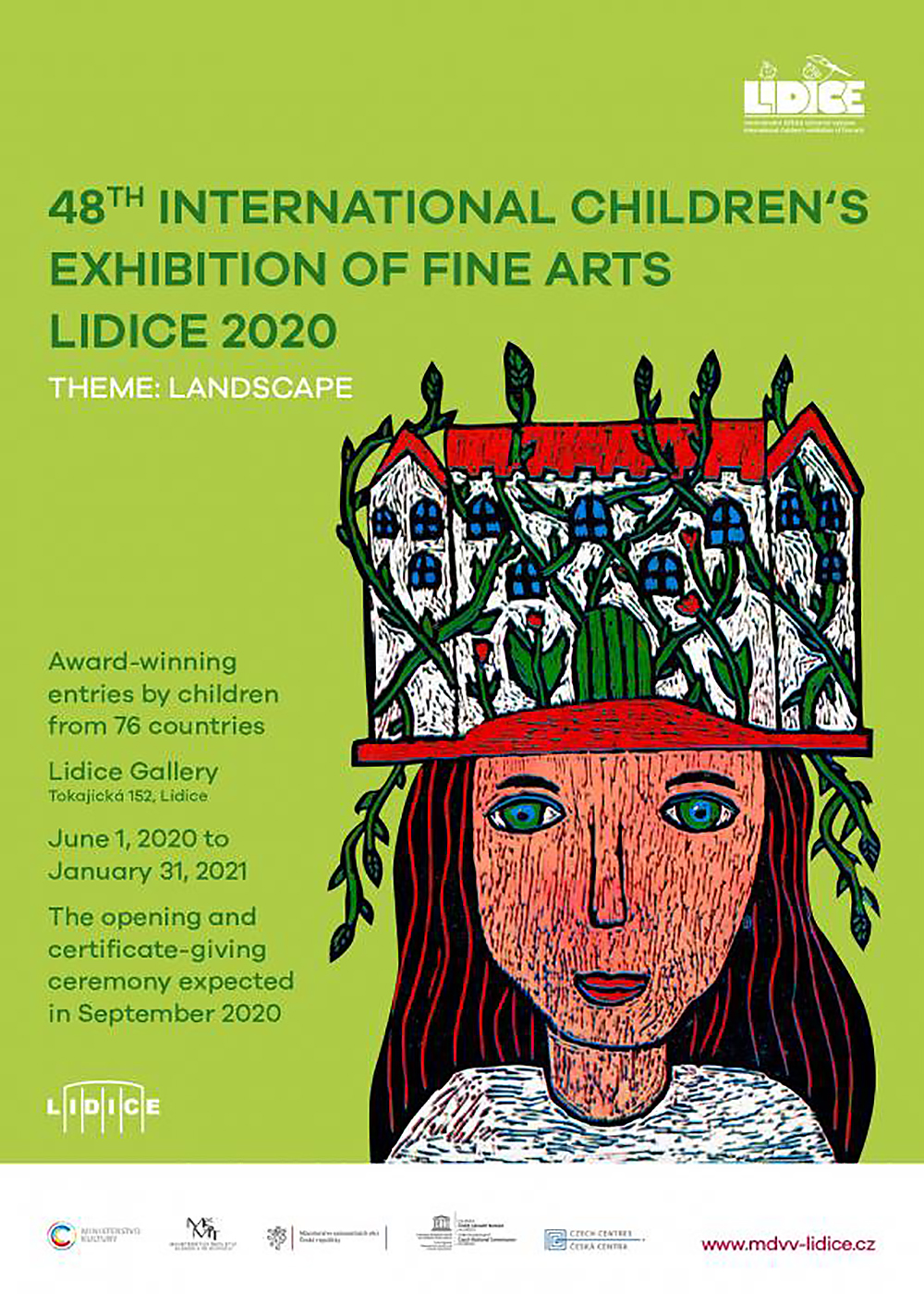An MTSU art education teacher and her students are feeling pretty “blue” about a charming new stop-motion animated video about global warming they and Tennessee School for the Blind students created for an international arts competition.
That’s “blue” as in clear blue skies, clear blue seas, and their amazing “Arctic Blues” creation, for which the teams won an honorable mention for expertly representing the United States among 22,000-plus diverse entries from 78 countries.
 “Arctic Blues” is only a minute long but packs a wallop with its simple story of a polar bear and her cubs watching their beautiful icy home disappearing.
“Arctic Blues” is only a minute long but packs a wallop with its simple story of a polar bear and her cubs watching their beautiful icy home disappearing.
It’s not too much of a spoiler to reveal that “Arctic Blues,” available to watch above, has a happy ending, like all the best children’s stories.
The project’s first happy ending was getting the paint and cotton balls and clay off everyone’s clothing. The most recent was their recognition, announced this month, from the 48th International Children’s Exhibition of Fine Arts Lidice 2020, a contest for children ages 4 to 16 around the world.

Dr. Debrah Sickler-Voigt
“Elementary through high school students from the Tennessee School for the Blind collaborated with pre-service art educators from MTSU to create the animation’s original set, narrative and sound effects,” professor Debrah Sickler-Voigt of the MTSU Department of Art and Design explained, adding that the art education students spent their fall 2019 and spring 2020 semesters on the project.
“The students’ film is designed to teach others about the importance of taking steps to reduce the harmful effects of climate change.”
The disarmingly simple one-minute video features button-eyed clay Arctic creatures, cotton-ball snowdrifts, tissue-paper ice floes, sea-colored aquarium stones and poster-painted backgrounds.
The MTSU students, who’ve been training to become K-12 art teachers in public and private schools, worked with Tennessee School for the Blind teacher Monica Leister and her students at both the TSB’s Nashville campus and in MTSU classrooms.
They taught the younger students how to use the textures of the materials used in the video to navigate their artwork and create designs.

A polar bear and her cubs are shocked at their polluted, disappearing habitat in this frame from “Arctic Blues,” a one-minute stop-motion animated video created by students from the Tennessee School for the Blind in Nashville and MTSU art education students. The video, one of more than 22,000 entries from 78 countries this spring in the 48th International Children’s Exhibition of Fine Arts Lidice competition, earned an honorable mention. (Photo from “Arctic Blues” video)
The TSB students also narrate the video, provide the animals’ “voices” and play a role in the story’s environmental “cleanup,” using sound and motion to aid their storytelling skills.
The MTSU educators-in-training also showed the younger students how to create their stop-motion animation. The art education students then refined and finalized the video for the contest entry.
Sickler-Voigt learned about the Lidice art projects for peace while researching illustrations for her textbook, “Teaching and Learning in Art Education: Cultivating Students’ Potential from Pre-K Through High School.”
She wound up visiting Lidice and has since served as one of the competition’s international judges.
Supporters established the ICEFA Lidice exhibition in 1967 to honor the children slain in June 1942 when Adolf Hitler ordered the annihilation of the entire Czech village of Lidice, located near Prague. About 340 people, including 88 children, died in the World War II massacre.
This isn’t MTSU’s first venture into ICEFA Lidice. Another group of MTSU art educators teamed up with TSB students in 2018 to create their first animated video, “Be Good Beach,” depicting happy beachgoers cleaning up trash.
That video, which also earned an honorable mention in the 46th annual Lidice competition, is available below.
The “Arctic Blues” video efforts provided needed hands-on teaching — and learning — experiences for the MTSU students, Sickler-Voigt said, and played a role in each of them landing jobs in their field, too.
“I’m just so proud that my students got hired right before graduation and right after … as art teachers,” the professor added.
 “These experiences will help with their own students, give them experience working with special-needs students and with writing grants. It’s all part of the bigger picture.”
“These experiences will help with their own students, give them experience working with special-needs students and with writing grants. It’s all part of the bigger picture.”
The contest winners’ works, including those earning the top “Rose of Lidice Medals,” will be on exhibit in Lidice beginning June 1 through Jan. 31, 2021. The exhibit also will be available via video at the ICEFA Lidice website at www.mdvv-lidice.cz/en.
For more information about the Art Education Program at MTSU, visit www.mtsu.edu/programs/art-education. For more on MTSU’s Department of Art and Design in the College of Liberal Arts, visit www.mtsu.edu/art.
— Gina E. Fann (gina.fann@mtsu.edu)

Visual artist Josef Zednik, chairman of the 48th International Children’s Exhibition of Fine Arts Lidice panel of judges, examines one of more than 22,000 entries from 78 countries this spring in the 2020 competition for children ages 4 to 16 at the ICEFA headquarters in Lidice, Czech Republic. Students from the Tennessee School for the Blind in Nashville, guided by MTSU art education students, earned an honorable mention for their one-minute stop-motion animated video entry, “Arctic Blues.” (Photo courtesy of ICEFA Lidice)

Happy Arctic animals, including polar bears, seals and a narwhal, celebrate their cleaner habitat in this frame from “Arctic Blues,” a one-minute stop-motion animated video created by students from the Tennessee School for the Blind in Nashville and MTSU art education students. The video, one of more than 22,000 entries from 78 countries this spring in the 48th International Children’s Exhibition of Fine Arts Lidice competition, earned an honorable mention. (Photo from “Arctic Blues” video)


COMMENTS ARE OFF THIS POST